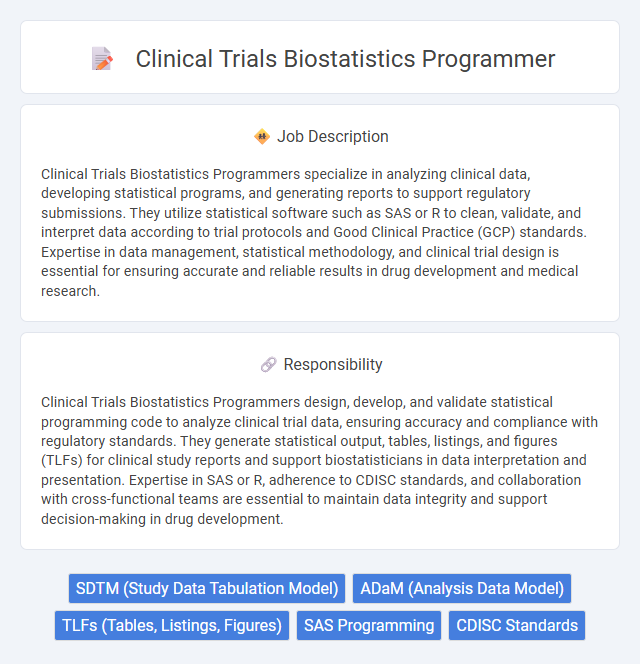
Clinical Trials Biostatistics Programmers specialize in analyzing clinical data, developing statistical programs, and generating reports to support regulatory submissions. They utilize statistical software such as SAS or R to clean, validate, and interpret data according to trial protocols and Good Clinical Practice (GCP) standards. Expertise in data management, statistical methodology, and clinical trial design is essential for ensuring accurate and reliable results in drug development and medical research.
Individuals with strong analytical skills and a passion for data interpretation are likely to be well-suited for a Clinical Trials Biostatistics Programmer role. Those comfortable working with complex statistical software and clinical data might find this job aligns with their expertise and interests. Candidates who thrive in detail-oriented environments and can navigate regulatory requirements probably have a higher probability of success in this position.
Qualification
A Clinical Trials Biostatistics Programmer must possess a strong foundation in statistics, programming languages such as SAS, R, or Python, and experience in analyzing clinical trial datasets. Proficiency in regulatory standards like CDISC, FDA submissions, and Good Clinical Practice (GCP) guidelines is essential for ensuring data integrity and compliance. Advanced degrees in biostatistics, epidemiology, or related fields combined with hands-on experience in clinical research environments enhance job performance and career prospects.
Responsibility
Clinical Trials Biostatistics Programmers design, develop, and validate statistical programming code to analyze clinical trial data, ensuring accuracy and compliance with regulatory standards. They generate statistical output, tables, listings, and figures (TLFs) for clinical study reports and support biostatisticians in data interpretation and presentation. Expertise in SAS or R, adherence to CDISC standards, and collaboration with cross-functional teams are essential to maintain data integrity and support decision-making in drug development.
Benefit
A Clinical Trials Biostatistics Programmer likely enhances research accuracy by efficiently managing and analyzing complex clinical data, increasing the reliability of trial outcomes. This role probably accelerates the drug development process through precise statistical programming, potentially reducing time to market. Employers could see improved decision-making quality in clinical studies, boosting the overall success rate of medical product approvals.
Challenge
The Clinical Trials Biostatistics Programmer role likely involves managing complex data sets and ensuring the accuracy of statistical analyses under tight deadlines. Navigating evolving regulatory requirements and adapting programming code for diverse clinical study designs might pose frequent challenges. Success in this position probably depends on strong problem-solving skills and meticulous attention to detail to ensure data integrity and reliable trial results.
Career Advancement
Clinical trials biostatistics programmers play a crucial role in analyzing and managing clinical data to ensure regulatory compliance and accuracy. Mastery of statistical software such as SAS, R, and Python accelerates career progression into senior programming roles, data management leadership, or biostatistician positions. Continuous skill enhancement and certification in clinical data standards like CDISC significantly boost opportunities for advancement within pharmaceutical and biotech companies.
Key Terms
SDTM (Study Data Tabulation Model)
A Clinical Trials Biostatistics Programmer specializing in SDTM utilizes expert knowledge in the Study Data Tabulation Model to organize and standardize clinical trial data according to CDISC guidelines. Proficiency in creating, validating, and managing SDTM datasets ensures regulatory compliance and facilitates efficient data analysis. Advanced skills in SAS programming and clinical data standards are essential to transform raw clinical data into submission-ready formats for FDA and other regulatory authorities.
ADaM (Analysis Data Model)
A Clinical Trials Biostatistics Programmer specializing in ADaM (Analysis Data Model) plays a critical role in the preparation and validation of analysis datasets that comply with CDISC standards. Mastery of ADaM ensures seamless integration of raw clinical data into formats suitable for statistical analysis, facilitating regulatory submissions to agencies like the FDA and EMA. Expertise in programming languages such as SAS, combined with deep knowledge of clinical trial protocols and metadata, drives the accuracy and efficiency of deliverables in drug development.
TLFs (Tables, Listings, Figures)
A Clinical Trials Biostatistics Programmer specializes in creating accurate, reproducible TLFs (Tables, Listings, Figures) that are essential for the interpretation and presentation of clinical trial data. Expertise in statistical programming languages such as SAS is critical for developing TLFs that comply with regulatory standards like CDISC and FDA submission requirements. Precision in generating TLFs ensures clear visualization of efficacy and safety endpoints, supporting data-driven decision making in drug development.
SAS Programming
A Clinical Trials Biostatistics Programmer specializing in SAS programming plays a critical role in data analysis and management for pharmaceutical and clinical research studies. Proficiency in SAS software enables efficient data cleaning, statistical analysis, and generation of tables, listings, and figures (TLFs) compliant with regulatory standards such as CDISC and FDA guidelines. Expertise in programming macros, validating datasets, and collaborating with biostatisticians ensures accurate reporting and supports decision-making in clinical trial outcomes.
CDISC Standards
Clinical Trials Biostatistics Programmers specialize in applying CDISC standards such as SDTM and ADaM to ensure consistent, high-quality clinical data submission for regulatory compliance. Expertise in programming languages like SAS or R enables efficient data manipulation, validation, and reporting aligned with CDISC guidelines. Mastery of CDISC standards enhances data integrity, streamlines analysis processes, and supports accurate interpretation of clinical trial outcomes.
 kuljobs.com
kuljobs.com